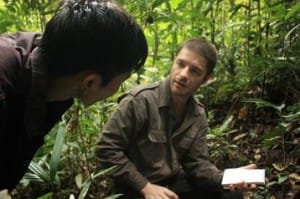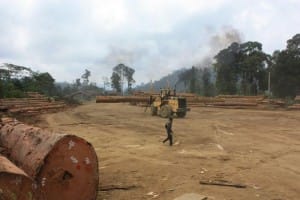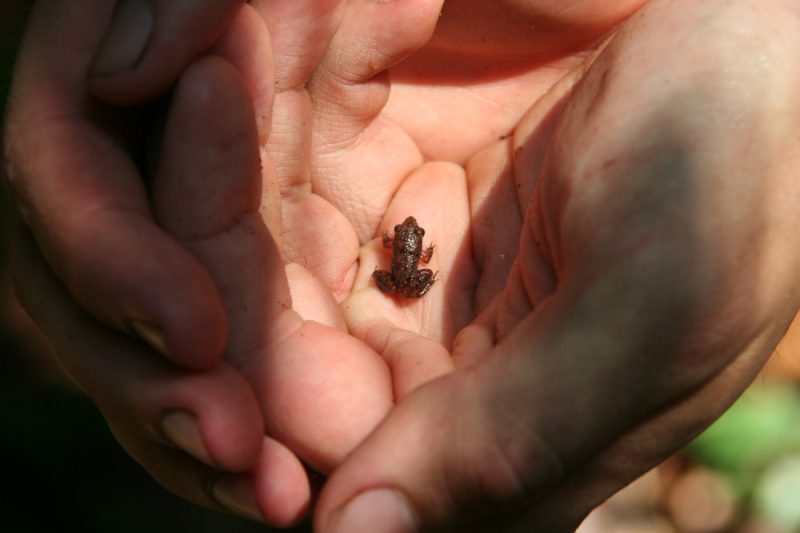Borneo, the largest island in Asia and the third largest in the world, is home to ancient rainforests that are 140 million years old, making them one of the oldest on planet Earth. Shared by Indonesia, Brunei and Malaysia, with Indonesia’s territory making up approximately 73% of the southern territory, the island of Borneo is an incredibly rich and diverse place in flora, fauna and culture. Sadly, development has been encroaching on her territory and is quickly destroying her natural beauty.
In the 1950s, the chainsaw and the tractor arrived on the island, causing much destruction to its rainforests. Satellite studies show that 56% of protected lowland rainforests were cut down between 1985 and 2001 to supply global timber demand. Protection laws are in effect, but inadequately monitored and enforced. The global demand for the production of palm oil has been one of the most devastating reasons for the demise of these ancient forests, as Indonesia and Malaysia account for over 90% of the world’s production area of this product, increasing from 600,000 hectares in 1985 to six million hectares in 2007.
With much of the lowland rainforests already destroyed, pressure is being put on the highland regions, like the Barito River watershed in Central Kalimantan. It is here that The Barito River Initiative for Nature Conservation and Communities (BRINCC) was founded whilst working at a research station in the Sebangau National Park’s Natural Laboratory, and where this pioneering organization is working on the forefront of conservation.
“Progress is inevitable,” Michal Zrust, BRINCC’s Director of Conservation tells me, “however, through science-based mitigation measures, we can help lessen the destructive impact on this fragile environment.” Michal graduated with a degree in Economics and ultimately ended up working in conservation via a number of research projects. He also works with large multinational palm oil companies to push for better production standards for the Zoological Society of London.
BRINCC’s work is separated into capacity building, biodiversity surveys and working with local communities. Their most impressive work is mapping one of the most understudied regions of Borneo, the Murung Raya Region. This map provides new data on species distributions, densities and population numbers, which are essential for making informed conservation decisions. BRINCC’s latest expedition extended the known ranges of many bird species, found numerous endangered tree species and tried to find the boundary of a known gibbon hybrid. This information will provide a deep understanding of the ecology of the region, essential in the policy decision process of the future.
BRINCC use standardized methodology for biodiversity mapping, such as the use of remotely activated camera traps to survey nocturnal animals. They also actively engage in the use of cutting-edge technology to provide researchers with an opportunity to field test and perfect methods. “On our current expedition, one of our visiting researchers is looking at the feasibility of using genetic analysis of blood extracted from leeches to survey rare mammals. If the leeches have sucked blood from, for example, a clouded leopard, we will know it is there, even if we never actually photograph it,” Michal explains.
BRINCC is very proud of the fact that their expeditions are majority Indonesian, employing local staff, including government officials and villagers. They take promising undergraduate and postgraduate students in Indonesia, fund them and bring them on their rainforest expeditions to gain invaluable knowledge.There have been two expeditions so far; the first expedition took place in 2011 and the latest, this year, is still ongoing. Team members are dedicated and extremely passionate individuals from varied backgrounds. BRINCC’s directors consists of: Andrea Höing (Germany), Director of Social-Ecological Research; Dominic Rowland (UK), Director of Expeditions; Director of Wildlife Ecology, Peter R. Houlihan (USA); Director of Mammal Research, Dr. Susan Cheyne (UK); and their leader, Michal Zrust (Czech Republic), Director of Conservation.
Working in the jungle environment for months at a time, and living in very basic conditions, can be very challenging. The team have suffered inevitable illnesses and nutritional deficiencies, not to mention the general lack of home comforts. But their passion for this region’s welfare has helped them through each expedition, bringing them back to this magical area which most of them have dreamt of coming to for years.
In order for their work to bring about a positive change, BRINCC believe that other stakeholders need to be engaged in the process, most importantly the companies themselves. “The industries working in the area
need to acknowledge the fragility of the environment in which they are working and as a group work to ensure mitigation of impacts on the landscape level. We are working to engage the industry players before extraction begins,” says Michal. The government is a fundamental player in ensuring that such extraction is done within the confines of the law and is the ultimate judge on where it is done and that it avoids negative impacts as far as possible.
Michal urges Indonesia’s economists to think of this natural habitat as having true monetary and intrinsic value if left intact. “Indonesia’s natural heritage is of fundamental value to its society, not just in terms of the magnificent biodiversity it holds, but also in terms of the services that it provides to its citizens and those of the world. The results of deforestation can be seen in the recent haze and this is underlined by loss of clean water provision, loss of fish in rivers, loss of micronutrients for local communities, as well as the incredible costs to human health from chest infections (amongst others).”
Michal’s words on how mankind must evolve to live side by side with nature are poignant. “It is only when we begin to value the services we receive from nature, rather than perceiving it as a free, exploitable good, that we will begin to make more sensible and sustainable development decisions.”BRINCC provides field data to inform and support policy development and implementation and are always open to collaboration, whether it is with the government, local or international civil society. They believe that with these partnerships, their work can have a much greater impact.
BRINCC’s work runs solely on donations and sponsorships. They welcome anyone who wishes to collaborate or support them in other ways to visit www.brinccborneo.org or email [email protected].




